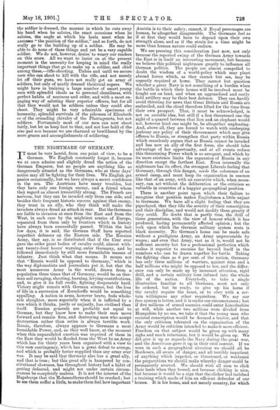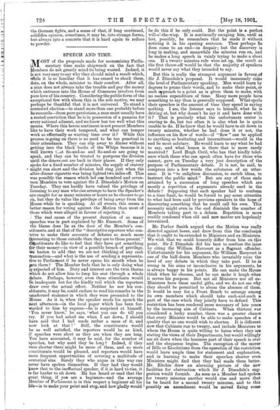THE NIGHTMARE OF GERMANY.
IT must be very horrid, from one point of view, to be a German. We English constantly forget it, because we at once admire and slightly dread the action of the German Emperor, but no people are anything like so dangerously situated as the Germans, who at three days' notice may all be fighting for their lives. We English get panics occasionally, but we have always a secret confidence in tho sea. The Austrians have many troubles, but they have only one foreign enemy, and a friend whom they regard as almost irresistibly strong. The French are nervous, but they can be invaded only from one side, and besides their frequent historic success against that enemy, they trust in an ally, who they think will make the invaders always dread an attack in rear. But the Germans are liable to invasion at once from the East and from the West, in each case by the mightiest armies of Europe, separated. from them only by frontiers which in history have always been successfully passed. Within the last few days, it is said, the German Staff have reported imperfect defences on the Eastern side. The Russian Army, they say, is so distributed that if the Czar ever gave the order great bodies of cavalry could, almost with- out twenty-four hours' warning, enter Germany, and be followed immediately by still more formidable masses of infantry. Just think what that means. It means not that "Russia would be opposed to Germany," which is the way diplomatists and journalists put it, but that the most numerous Army in the world, drawn from a population three times that of Germany, would be on Ger- man soil ravaging, shooting, burning, levying contributions, and, to give it its full credit, fighting desperately hard. Victory might remain with German science, but the loss of life in a succession of Zorndorffs would be something appalling. A nation in arms, however brave, feels whole- sale slaughter, more especially when it is inflicted by a race which it thinks, justly or unjustly, less civilised than itself. Russian generals are probably not equal to German, but they know how to make their men move forward and remain firm, and destroying men who accept destruction rather than retire is always terrible work. Russia, therefore, always appears to Germans a most formidable Power, and, as they well know, at the moment when this unparalleled exertion was required of them in the East they would be flooded from the West by an Army which has for thirty years been organised with a view to this very contingency, which has a great defeat to avenge, and which is probably better supplied than any army ever was. It may be said that Germany also has a great ally, and that is true ; but this great ally is hampered by con- stitutional slowness, has throughout history had a habit of ,r defeated, and might not under certain circum- stances be completely zealous. It is not the interest of the Hapsburgs that the Hohenzollerns should be crushed ; but to see them suffer a little, to make them feel how important Austria is to their safety, cannot, if Royal personages are human, be altogether disagreeable. The Germans feel as if at first they would have to depend upon their own strength alone, and as if the strain for a time might be more than human nature could endure.
We are pressing this consideration just now, not only because the reported swing of the German Army towards the East is in itself an interesting movement, but because we believe this political nightmare greatly to influence all German politics. The people are almost compelled to doubt the wisdom of a world-policy which may plant abroad forces which, as they cannot but see, may be urgently required at home. They cannot but question whether a great Navy is not something of a burden when the battle in which their homes will be involved must be fought out on land, and when an aggrandised and costly field artillery may be their best defence. They can hardly avoid thirsting for news that Great Britain and Russia are embroiled, and the cloud therefore lifted for the time from their own prospect. That, it must be acknowledged, is not an amiable idea, but still if a lion threatened one the sight of a quarrel between that lion and an elephant would not, however kind one might be, be altogether unpleasing. And, above all, they are forced to watch with unsleeping jealousy any policy of their Government which may give offence to Russia, or strengthen that party within Russia which ceaselessly argues that as Russia cannot be invaded and has now an .ally of the first force, she should take advantage of her opportunity, and at all events reduce this threatening Power which is so arrogant, and which by its mere existence limits the expansion of Russia in any direction except the farthest East. Even internally the nightmare has its effect, the strongest Liberals feeling that Germany, through this danger, needs the coherence of an armed camp, and must keep its organisation in essence like that of an army, with an executive which, when neces- sary, can act without the deliberation or the criticism so valuable in countries of a happier geographical position.
There is another point upon which their failure to recognise that position makes Englishmen a little unjust to Germans. We have all a slight feeling that they are pipeckyed, that they like the severity of their conscription and their discipline, and would not modify them greatly if they could. No doubt that is partly true, the drill of three generations, with the view of honour which it has produced, having permanently affected opinion ; but the rock upon which the German military system rests is black necessity. No German's home can be made safe without a prodigious Army, an Army unprocurable by wages ; and even that Army, vast as it is, would not be sufficient security but for a professional perfection which makes it superior to enemies far beyond itself in the numbers who can be drawn together for battle. Taking the fighting class as 6 per cent. of the nation, Germany has only three millions of warriors, against nine and a half millions who might be opposed to her, and the differ- ence can only be made up by incessant attention, rigid drill, and a certain military tone infused into the whole life of the nation. Everybody, to take a single illustration familiar to all Germans, must not only be ordered, but be ready, to give up his horse if the cavalry require the beast, or to obey with a cer- tain willingness any other requisition. We say our free system is better, and it is under our circumstances • but if five millions of armed enemies could enter Lincolnshire at will, while another two millions were divided from Hampshire by no sea, we take it that the young man who resisted conscription would be deemed a traitor, and that the only criticism tolerated on the organisation of the Army would be criticism intended to make it more efficient. Freedom on that subject would be given up with many sighs and much reluctance, but it would be given up. We did give it up as regards the Navy during the great war, and the Americans gave it up in their civircontest. If we were in such a geographical situation we should all be Borderers, all aware of danger, and all terribly impatient of anything which impeded, or threatened, or weakened the preparations we should make whereby danger could be permanently averted. We should wish all men to click their heels when they bowed, not because clicking is nice, but because it would be a sign that the clicker had imbibed a training which made of him an efficient defender of our homes. It is his home, and not merely country, for which the laerman fights, and a sense of that, if long continued, solidifies opinion, sometimes, it may be, into strange forms, but always into a concrete that it is hard again to reduce to powder. -







































 Previous page
Previous page